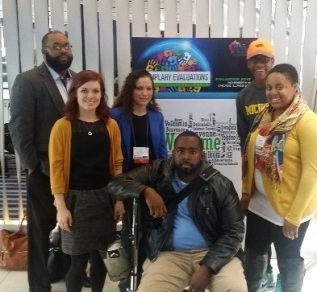My GEDI journey continues, Marques Hogans Sr., IMPACT Planning Council’s American Evaluation Association Graduate Education Diversity Internship recipient.
I am excited to share my thoughts from my second professional development excursion as a GEDI Intern. First off, getting a break from the single degree winter weather in Wisconsin is always a plus; enjoying the sunny skies of “winter” in California was something closer to heaven. Myself, along with seven other distinguished colleagues who received designations as GEDI scholars made our way to Los Angeles to embark on another group gathering. Without the scheduled workshops, meet and greet receptions, this trip was a little different from those in my previous blogs.
It began with the norm, checking in to our hotel and waiting for whoever shows up next. This reminded me of being the first to arrive at a family outing and awaiting the arrival of a family member you had not seen in ages or months. Then quickly understanding that – as much as you just wanted to sit by the pool, sightsee, and spend unnecessary money – this trip was about business, evaluation business. I had a half a day to wind down and get mentally prepared for what was to come. Walking boot and all, the next couple of days were pertinent to my experience as a GEDI.
what was to come. Walking boot and all, the next couple of days were pertinent to my experience as a GEDI.
First up was learning from the former President of AEA, Stewart Donaldson and Dr. Marv Alkins of UCLA, and a tour of its storied campus that 30,000 students apply to every year. The time with Dr. Donaldson, as a well-respected colleague in evaluation, added to the skill set of the Culturally Responsive Evaluators he has taken under his wings. Dr. Alkins’ on the other hand area of expertise is evaluation theory. Being less versed in theory than my GEDI colleagues, his level of knowledge was astonishing, guiding me in the direction of evaluation theory. If you read my previous blog, you know that I’ve been using a knee scooter to get around- I was smart not to bring it on the tour. While going up and down stairs, weaving through landmarks on a mending Achilles tendon, I was taken away by the beauty of the UCLA campus. From historic buildings that separate the colleges, to the bruin bear statue in the epicenter of campus, it gave me a chance to step out of the now and back to memories of my undergrad time at Kentucky State University. Undergrad is where it all began; daydreaming.
Part of the experience on this GEDI trip that I found really useful was visiting agencies where different people had made careers in evaluation. Each site introduced us to evaluation in real-world settings, including:
Harder and Company : very similar in scope to IMPACT Planning Council as its evaluation projects spanned a broad range of areas, many of which focused on improving the community from agencies within the community.
First 5 LA : a government entity focused on early childhood advocacy and working under the policies and regulations implemented by the state.
Cobblestone Applied Research and Evaluation: a stand-alone agency with an emphasis on STEM (science, technology, engineering, and mathematics) evaluation
Each site possessed its own unique identity under one common concept, evaluation. Personally it was also great to hear that work did not carry over to life. Most employees had families, children, or pets. I have two children (Marques Jr. and Makenzie) who require more of me than any career. Marques Hogans Sr.

 My name is Marques Hogans, a native Milwaukeean, a Milwaukee Public Schools product, and a Historically Black Colleges and Universities graduate. I was introduced to evaluation after meeting Kathleen Pritchard, Vice President of Planning and Evaluation for IMPACT, Inc. during my pursuit of a Master’s in Public Health at the Medical College of Wisconsin. After a brief sit down during which I expressed my interest in determining impact of programs, she explained GEDI and from that day it was set in my phone calendar to apply. My initial purpose for applying was to continue building a foundation as a member of the public health workforce and increase marketability for future career opportunities. My purpose has changed! During the application process, Lisa Larson, Director of Research and Evaluation at IMPACT, became a defining factor and her stick-to-it-ness was encouraging.
My name is Marques Hogans, a native Milwaukeean, a Milwaukee Public Schools product, and a Historically Black Colleges and Universities graduate. I was introduced to evaluation after meeting Kathleen Pritchard, Vice President of Planning and Evaluation for IMPACT, Inc. during my pursuit of a Master’s in Public Health at the Medical College of Wisconsin. After a brief sit down during which I expressed my interest in determining impact of programs, she explained GEDI and from that day it was set in my phone calendar to apply. My initial purpose for applying was to continue building a foundation as a member of the public health workforce and increase marketability for future career opportunities. My purpose has changed! During the application process, Lisa Larson, Director of Research and Evaluation at IMPACT, became a defining factor and her stick-to-it-ness was encouraging.




